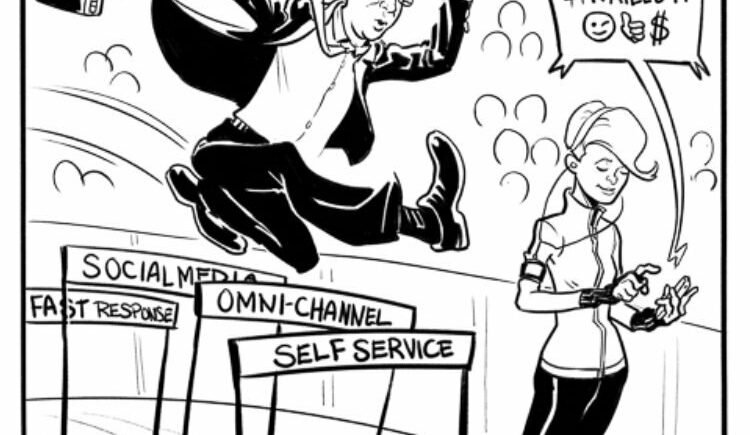Millennials are the largest generation in U.S. history. They’ll soon be in command of the largest amount of wealth in U.S. history, shaping consumer demand for years to come. This generation, born between 1980 and 2000, is fast approaching prime spending years. According to Ad Age, these U.S. consumers are estimated to spend $200 billion annually by 2017 and $10 trillion over their lifetimes. In light of these figures, its no surprise that millennial marketing is becoming a requisite for survival. To compete, companies in all verticals are creating a millennial-friendly customer journey.
Many that read this think that millennial-influenced anything is unfavorable. Millennials often get a bad reputation, but some of these characteristics are expediting a shift in service standards for many companies. The generation of technology and man buns is inspiring companies to adopt customer-centric service strategies that cater to customers of all ages.
So what is millennial-friendly customer service? To answer this question, we need to understand the characteristics that make the millennial generation unique. Having grown up in a time of rapid change, they have different customer service expectations and priorities than previous generations, and they directly influence their spending habits. Luckily for us, businesses are using these differences as road maps towards millennial-friendly customer journeys that benefit consumers as a whole.
These generational characteristics of millennials will greatly influence customer service:
1. They expect technology to work.
They’ve grown up with the internet, mp3 players, and mobile devices so they naturally align themselves with technology. In the millennial’s lifetime, technology has become much more user-friendly. Relentless focus on user-friendliness at big brands like Amazon and Google set the standard of intuitiveness, and now millennials expect it as the norm.
Companies should expect that clumsy devices or websites will alienate millennials; they will not be patient or understanding while they struggle to find a workaround. Millennials expect technology to work because the computers and devices they grew up with are more reliable than those to which the previous generation was accustomed.
2. They hold mobile near and dear.
According to Pew Research Center, 4 in 5 millennials sleep with or next to their cell phones. Not surprisingly, they own more cell phones, text more and use them more than older generations. It is common for millennials use their mobile device to find the best bang for their buck. They’ll read reviews, research products, and compare prices while shopping in-store. Businesses have responded with more competitive price points, special offers, sales and higher-quality products. Not only do businesses offer these things, they promote them on a variety of channels, like mobile app, text messaging, and email.
3. Millennials are social.
Millennials’ predisposition towards social sharing and brand promoting is another major motivator for companies to create impressive customer experiences. Millennials are vociferous consumers that aren’t shy about sharing their brand experiences through blogs, reviews, and social media sites. They will shop in groups and seek opinions of others in the researching and buying process. Not only do they share with peers, they’re also very social with other generations, making millennials brand promoters to their parents and grandparents.
4. They believe in working together.
Millennials are very community-oriented and have a collaborative mindset. This group believes that together, we can make the world a better place. They are likely to support brands that are socially responsible, encouraging corporate giving and social responsibility initiatives, like environmentally-friendly operations and productions.
Brands are harnessing the co-creation mindset of millennials, offering opportunities to collaborate in product development. This creates an informed product design while helping brands gain in loyalty, maintaining an edge over competitors.
5. They’re researchers.
Comparison shoppers by nature, millennials are proficient at finding the brands that work best for them. They like to keep their options open, holding out for companies that meet all the important criteria: personalized experiences, social responsibility, value, and accessibility often top the list. If a brand isn’t living up to these expectations, millennials won’t wait to explore new options and trends.
6. Millennials are impatient.
This fast-moving faction of our population doesn’t like to wait. They anticipate fast and accurate responses in their preferred channels. Companies that are easy to reach on a variety of platforms and provide easy access to self-service options like a website or mobile content are more likely to win the affection of the millennial generation.
Woe to the company that doesn’t cater to these connected researchers and social sharers. Investing in seamless, personalized service environments will help businesses live up to the high expectations of the millennial generation that is less likely to forgive customer service failures. According to a global survey by SDL, 27% of young millennials will not try to resolve a failure, compared to 13% of baby boomers. Once a company has failed a millennial, the chances are good that the poor experience will be shared in any number of channels.
Realizations like these are keeping companies on their toes, striving to keep the support of the millennial generation whose high standards and social connectedness benefit the rest of us in our customer service endeavors.
The Aceyus blog is co-authored by: Ben Vesta, Vice President of Product Development and Kortney Parkman, Marketing Specialist.



